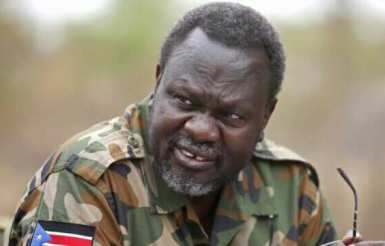Top rebel commanders blame SPLM-IO leadership for delayed military operation
May 10, 2015 (ADDIS ABABA) – Rebel sources in South Sudan revealed that top military commanders expressed frustration and criticism against their commander-in-chief, Riek Machar, for his lack of seriousness in handling the war against president Salva Kiir’s government.

“They believed Dr Riek Machar was underestimating the war, that he didn’t want to fight it wholeheartedly in order to overthrow Salva Kiir’s government by force,” a source close to the conference revealed the atmosphere at the time to Sudan Tribune on Sunday.
The commanders, he said, were visibly expressing anger against president Kiir, a Dinka, whom they accused of overseeing the massacre of thousands of civilians from the Nuer ethnic group in the capital, Juba, in mid-December 2013.
He said while all the commanders who spoke hailed Machar for his visionary leadership and confirmed their allegiance to him, they were also frustrated that he didn’t do enough to fight the government.
“In particular the commanders were not happy that their commander-in-chief was not interested to seriously mobilise for sufficient weapons and ammunition to counter the government’s weaponry and defeat it.”
The source further claimed the top military officers expressed optimism based on their field assessments of their fighters that they would defeat the government and take over Juba if war equipment were to be availed.
One of the most top rebel commanders, Gen. Peter Gatdet Yak, deputy chief of general staff for operations in the rebel military command council, was quoted to have been explicit about his assessment of the operations, saying even the national capital, Juba, would be within reach if the weapons were brought.
“If you bring to me the weapons and ammunitions order me to lead an attack on Juba to remove Salva Kiir from power, nobody can afford to stop me on the way to Juba. If I die I can die inside Juba, not outside Juba,” he was quoted as saying to Machar.
General Gatdet was the overall commander of the government troops in Jonglei state before the war erupted in December 2013 and had to switch allegiance to Machar’s group, killing his deputy, and took over the state capital, Bor.
Like other rebel commanders, he said he had to act in defence of the Nuer civilians targeted in Juba by president Kiir’s presidential guards and Dinka militia forces he recruited but not because he wanted Machar to become the president at the time.
“Nobody fired a bullet when Dr. Riek Machar was removed from the position of the vice-president since June 2013 until when Nuer civilians were for no reason massacred in thousands in December, six months later,” he said.
SPLM-IO rebels say they were able to capture Juba and overthrow the government of President Salva Kiir during the first weeks of the conflict before the intervention of the Ugandan troops in the fighting.
Further, different sources confirmed that American pressures on the former rebel leader pushed Machar to stop the march of his troops towards Juba saying Washington, threatened to not recognise the new government if it took over power by force.
The source said Machar seemed to have persuaded and convinced his military commanders to give the peace process a chance before a resort to a full scale war could become a possible last option if peace fails.
However, he said it was a difficult situation for the rebel leader trying to balance between the urge by his military commanders to wage war and the quest by politicians and the international community to make peace.
Last April the Intergovernmental Authority on Development (IGAD) chief negotiator announced that African Union’s (AU) Peace and Security Council (AUPSC) has selected five countries to join the new process of IGAD-Plus which will include other international entities.
But no date has been yet determined for the resumption of the talks.
(ST)
